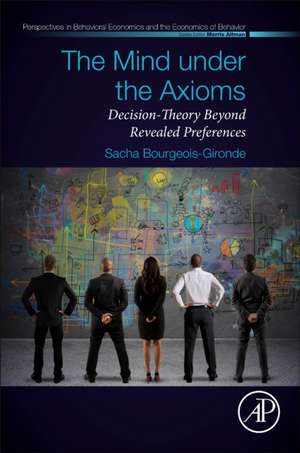The Mind under the Axioms: Decision-Theory Beyond Revealed Preferences: Perspectives in Behavioral Economics and the Economics of Behavior
Autor Sacha Bourgeois-Girondeen Limba Engleză Paperback – 18 sep 2019
- Addresses open and evolving theoretical issues in decision-theory, especially from experimental perspectives
- Helps researchers understand the psychological and neuroscientific mechanisms for decision-making
- Considers how preferences shape beliefs and how beliefs shape preferences
- Uncovers the very formal and abstract psychological and behavioral implications that are actually made in contemporary decision-theory
Preț: 684.18 lei
Preț vechi: 937.42 lei
-27% Nou
Puncte Express: 1026
Preț estimativ în valută:
130.91€ • 136.69$ • 108.35£
130.91€ • 136.69$ • 108.35£
Carte tipărită la comandă
Livrare economică 29 martie-12 aprilie
Preluare comenzi: 021 569.72.76
Specificații
ISBN-13: 9780128151310
ISBN-10: 0128151315
Pagini: 216
Dimensiuni: 152 x 229 x 16 mm
Greutate: 0.3 kg
Editura: ELSEVIER SCIENCE
Seria Perspectives in Behavioral Economics and the Economics of Behavior
ISBN-10: 0128151315
Pagini: 216
Dimensiuni: 152 x 229 x 16 mm
Greutate: 0.3 kg
Editura: ELSEVIER SCIENCE
Seria Perspectives in Behavioral Economics and the Economics of Behavior
Public țintă
Graduate students and 1st year PhDs in economics, particularly those enrolled in courses in theoretical economics / decision-theory / behavioural economics / experimental economics. Graduate students in psychology, cognitive sciences programmes, decision neurosciencesCuprins
1. Cardinalism2. Incompleteness3. State-dependence4. A Conclusive Remark: Decision Theory and the Transistion from the Unconscious to the Conscious
Recenzii
"Bourgeois-Gironde does not attempt to produce a comprehensive review of applications of the axioms to experiments, but instead goes deep into three cases. Bourgeois-Gironde has produced exemplary economic methodology here: rigorous, practical, and addressing live concerns in contemporary economics. His book addresses the integration of economics and psychology in a way that, unlike too much recent behavioral economics, does not simply opportunistically import concepts across the interdisciplinary frontier without carefully preparing them for deep integration into their new theoretical contexts. Experimental economists can use ideas from psychology without abandoning the axioms, and doing so is the road to finding relationships of enduring significance, as opposed to isolated behavioral ephemera." --Oeconomia








